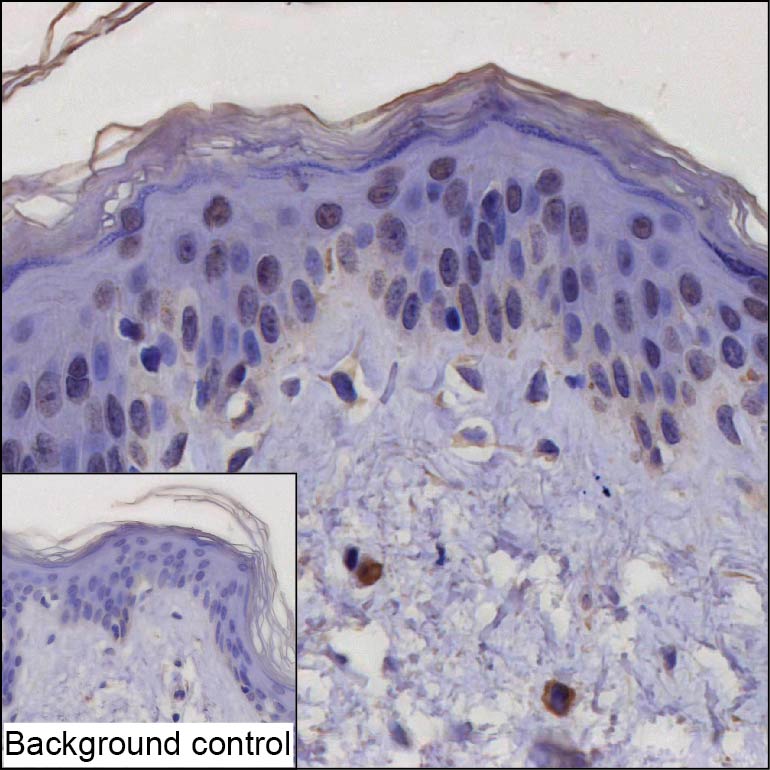
| WB | 咨询技术 | Human,Mouse,Rat |
| IF | 咨询技术 | Human,Mouse,Rat |
| IHC | 1/50-1/250 | Human,Mouse,Rat |
| ICC | 技术咨询 | Human,Mouse,Rat |
| FCM | 咨询技术 | Human,Mouse,Rat |
| Elisa | 咨询技术 | Human,Mouse,Rat |
| Host/Isotype | Mouse IgG1 |
| Antibody Type | Primary antibody |
| Storage | Store at 4°C short term. Aliquot and store at -20°C long term. Avoid freeze/thaw cycles. |
| Species Reactivity | Human |
| Immunogen | Purified recombinant fragment of human POU2F3 |
| Formulation | Purified antibody in PBS with 0.05% sodium azide |
+ +
以下是关于POU2F3抗体的3篇文献示例(内容基于公开研究概括,具体文献需通过学术数据库验证):
1. **文献名称**:*POU2F3 identifies a subgroup of small cell lung cancer with distinct therapeutic vulnerabilities*
**作者**:Huang YH, et al.
**摘要**:该研究利用POU2F3抗体检测小细胞肺癌(SCLC)亚型,发现POU2F3高表达肿瘤依赖独特的信号通路(如EGFR和NOTCH),为靶向治疗提供依据。
2. **文献名称**:*Neuroendocrine tumor heterogeneity and the role of POU2F3 in tuft cell-like variants*
**作者**:Baine MK, et al.
**摘要**:通过免疫组化(使用POU2F3抗体)分析神经内分泌肿瘤,揭示POU2F3在tuft细胞样亚型中的特异性表达,提示其作为诊断标志物的潜力。
3. **文献名称**:*ASCL1. NEUROD1. and POU2F3 define molecular subtypes of small cell lung cancer with therapeutic implications*
**作者**:Rudin CM, et al.
**摘要**:研究基于POU2F3抗体标记的蛋白表达,将SCLC分为不同分子亚型,其中POU2F3阳性肿瘤对特定化疗药物敏感性更高。
如需具体文献,建议通过PubMed或Google Scholar搜索标题及作者获取全文。
POU2F3. a member of the POU transcription factor family, plays a critical role in regulating gene expression and maintaining cellular identity. It is specifically expressed in certain epithelial and neuronal lineages, including Merkel cells and a subset of tuft cells in the gastrointestinal tract. Research has highlighted its importance in cancer biology, particularly in small cell lung cancer (SCLC), where POU2F3 is identified as a lineage-specific oncogenic driver in a distinct molecular subtype called SCLC-P. This subtype lacks neuroendocrine markers but relies on POU2F3 for survival and proliferation.
Antibodies targeting POU2F3 have become essential tools for studying its expression patterns, functional mechanisms, and therapeutic potential. These antibodies enable the detection of POU2F3 in tissue samples via immunohistochemistry (IHC) or immunoblotting, aiding in tumor classification and biomarker discovery. Recent studies also explore POU2F3 as a therapeutic target, with antibodies potentially guiding drug development for POU2F3-dependent cancers. However, challenges remain in understanding its regulatory networks and context-specific roles across tissues. Overall, POU2F3 antibodies are pivotal in advancing both basic research and clinical applications in oncology and developmental biology.
×